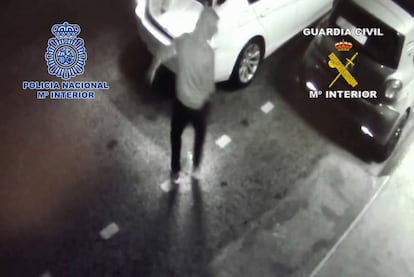Spanish police deal “final blow” to bloodthirsty Costa del Sol gang “the Swedes”
Three more members of the international network, allegedly responsible for a series of brutal killings, have been arrested as part of a major crackdown

On November 30, Spanish authorities announced they had brought down the most dangerous gang on the Costa del Sol. The group – North African in origin, but from Malmö in Sweden, hence their nickname of los suecos, or “the Swedes” – was behind a series of cold-blooded killings in Málaga. They targeted the area’s top drug traffickers, including David Ávila Ramos, also known as “Maradona,” who was shot dead on leaving his son’s first communion, and Sofian Mohamed A.B., who was murdered by a hooded hitman on a bicycle.
Operation Rueda, an operation carried out in close conjunction between the Spanish and Swedish police, led to the arrest of nine gang members: five in Málaga and four in Malmö. Now another three members of the “the Swedes” have been caught as part of Operation Mudhika-Letonia. Police say they have dealt the “final blow” to the deadly criminal organization.
The three are being held responsible for two bomb explosions
The three men are accused of planting explosive devices at the home of Mohamed A. B., a Moroccan drug dealer and owner of a car-washing business. Mohamed was at home with his wife and three children when the explosion went off, but no one was hurt.
Minutes later, another bomb exploded in an industrial warehouse owned by Mohamed in San Pedro de Alcántara. The warehouse was located near a gym belonging to Ramos, which was burned down months earlier as a “warning,” police say.
The explosions were so strong they damaged the foundations of the buildings where they had been planted and a group of bomb disposal experts had to be called in.
Escape
Not long after the explosions, police found a burning vehicle in Nagüeles, a neighborhood in Marbella. After the fire was put out, officers found out that the car had false plates and had been stolen years ago in Belgium. It had also been linked to other crimes the police had been following.
Investigations launched independently by the National Police and the Civil Guard both led to the international gang of hitmen, which was based in Malmö but operated in various European countries including Spain. The police forces began to work together to catch the gang.
Police determined that those responsible for planting the bombs had used the car to transport the explosives and set it on fire to cover their tracks.
Working closely with Swedish police, authorities discovered that the organization was also behind multiple violent incidents in Sweden involving explosives. Police identified multiple members of the gang, all aged between 20 and 30, and found overwhelming evidence that they were responsible for the explosions.
From Malmö to Marbella
Two members of the gang were found in Malmö and captured in a carefully organized operation led by Swedish police. Spanish police and Civil Guard officers also traveled to Sweden to take part in the operation. A third member of the organization was arrested in Marbella.
Police uncovered various evidence of their involvement, including bullet-proof and anti-explosive vests during four homes raids (three in Sweden and one in Spain). The three are charged with possession of illegal explosives, murder, belonging to a criminal organization, material damage and falsifying public documents.
English version by Melissa Kitson.
Tu suscripción se está usando en otro dispositivo
¿Quieres añadir otro usuario a tu suscripción?
Si continúas leyendo en este dispositivo, no se podrá leer en el otro.
FlechaTu suscripción se está usando en otro dispositivo y solo puedes acceder a EL PAÍS desde un dispositivo a la vez.
Si quieres compartir tu cuenta, cambia tu suscripción a la modalidad Premium, así podrás añadir otro usuario. Cada uno accederá con su propia cuenta de email, lo que os permitirá personalizar vuestra experiencia en EL PAÍS.
¿Tienes una suscripción de empresa? Accede aquí para contratar más cuentas.
En el caso de no saber quién está usando tu cuenta, te recomendamos cambiar tu contraseña aquí.
Si decides continuar compartiendo tu cuenta, este mensaje se mostrará en tu dispositivo y en el de la otra persona que está usando tu cuenta de forma indefinida, afectando a tu experiencia de lectura. Puedes consultar aquí los términos y condiciones de la suscripción digital.








































